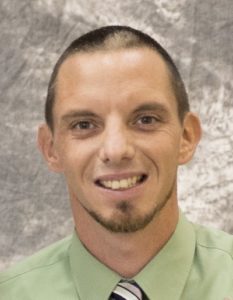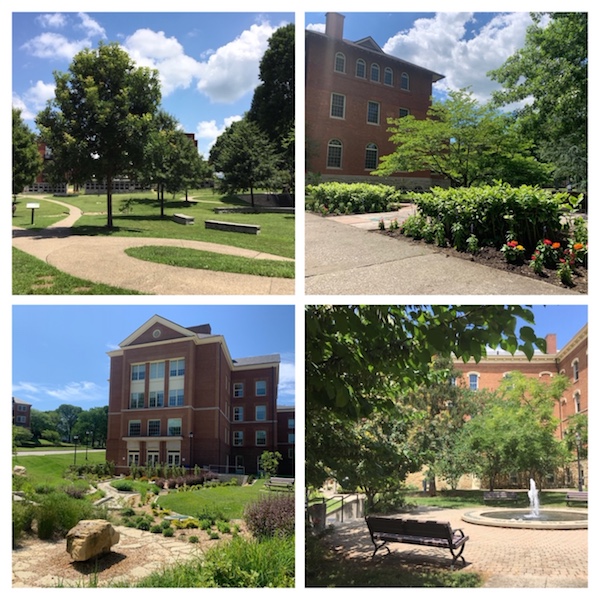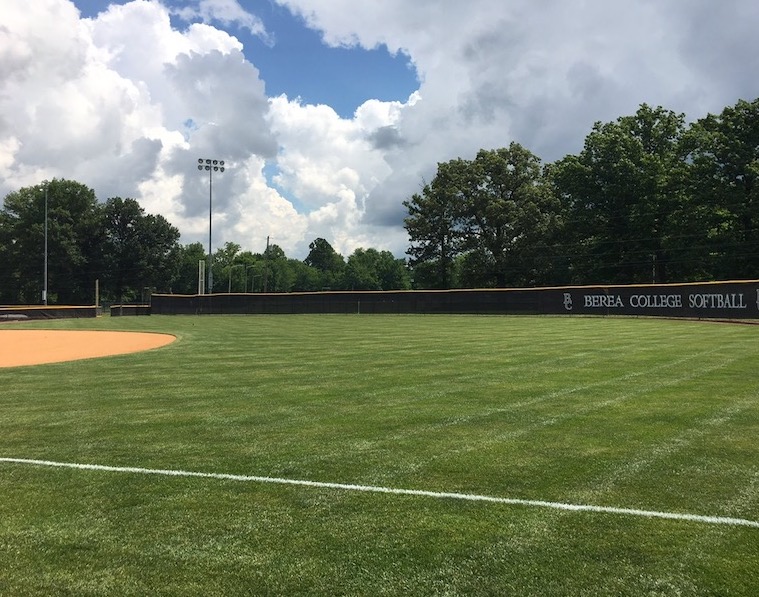In this edition of the SportsField Management Interview, we meet Eric Harshman, grounds superintendent, Berea College, Berea, Ky. In addition to a degree in turf science/management from Rutgers University, Harshman also holds degrees in graphic design and business management. Prior to Berea College, Harshman worked at Hurstbourne Country Club (Louisville, Ky.), the Louisville Bats (Minor League Baseball), Louisiana State University, University of Kentucky, and the Lexington Legends (Minor League Baseball). Harshman has served on various STMA committees through the years, and has won two STMA Field of the Year awards – both the College Softball category (one while at Louisiana State University, and the other at University of Kentucky). He is military veteran, having served in the Air Force National Guard.
SportsField Management(SFM): Please start by telling us a little bit about Berea College.

Harshman: The college itself was founded in 1855. It integrated African American males, giving them a place where they could get an education. From there they opened it to African American females. It has since opened to people who would typically not have the opportunity to go to college. A lot of our student population is from Appalachia, but we have students from throughout the United States and internationally. The college is 100-percent work based, so the students work for their tuition. The students are required to work what equals out to about 160 labor hours per semester. So I have students who work anywhere from 10 hours per week to some of my upper classmen who work up to 15 hours per week. They work, they don’t pay any tuition – they pay for room and board and books. At the end of the day, they can graduate with a four-year bachelor’s degree and maybe only have $5,000 to $8,000 of student debt, which is almost unheard of. The student athletes don’t get a break either. Not only do they have to fulfill their academic responsibilities, they also have to work. They have a labor position and they have to juggle that on top of practice schedules and events.
SFM: What types of jobs do the students who work for you perform?
Harshman: I have them doing anything that any of my full-time staff do. When they come in as a freshman, I key in on certain things. All the new students coming in that freshman year have to present a resume to the labor office. I think last year I sorted through 220 resumes. I’m looking for students who have landscape backgrounds, who come from farms, who have that kind of work ethic and a willingness to learn. I even look for students who were Eagle Scouts and things that show they have commitment and have that determination to reach something bigger. The students do a lot of our weed eating and landscape maintenance. I bring them up to speed slowly. A lot of them come from situations where they’ve never had a job before, so I really have to get to know the students as best as I can, but pretty quickly as well. I’m not going to take students and put them on a mower if they are not comfortable. But I definitely give the students the opportunity to learn all the equipment –tractors, mowers, weed eaters, even chain saws and chippers. We go through training with all of the students, and refresher courses with the full-time staff as well.
SFM: Tell us about how you got interested in sports field management, as well as what got you to where you are today.
Harshman: I was born and raised in Bluffton, Indiana, just south of Fort Wayne. I really liked playing sports and hanging out with my friends. I didn’t have a dead set career path. I ended up joining the military straight out of school, and I went into the Air Force National Guard. I knew that if I went into the military I could offset some of the costs with G.I. grants. My first bachelor’s degree is in graphic design. I did a lot of catalog layout design work, and was in an office setting. I thought I would enjoy that. I later went back to school and got a business administration degree from Indiana Tech University with an emphasis on sports marketing, but I didn’t really find the type of job I was looking for. I ended up working at a golf course (owned by the family of my now wife) and really enjoyed it. We got married and moved to Louisville, Ky. I made some cold calls, and ended up working at Hurstbourne Country Club. I worked for a great superintendent – Walter Pritchett. He gave me a start, ended up making me his third assistance, and I was managing the 9-hole practice facility at the golf course. The first assistant and I hit it off pretty well, and he started talking to me about furthering my education. He was a graduate of Rutgers University’s two-year accelerated program. One thing led to another and I was in New Brunswick, N.J.; I went in January 2006 and graduated in March 2008.
I was working at the golf course, and they gave me a pro-rated salary while I was in school. I came back home needing to do an internship. I spoke to James Bergdoll [CSFM], director of parks maintenance in Chattanooga (he is my cousin). He said I needed to talk to Tom Nielsen with the Louisville Bats. I made a call, and Tom asked me to come down to the stadium. He offered me a game day job. For the first several months after being home from Rutgers, I was getting to work at the golf course at 6 a.m. or earlier, working until 1 or 2 p.m., then going straight to the baseball stadium and working game day for Tom until 10 or 11 at night. I was burning the candle at both ends, but loving every second of it. I was passionate about what I was doing. I was a sponge. I was soaking it all in. I was gaining some valuable knowledge on the golf course side; and then on baseball it’s a whole different animal. I had to make a tough decision. I couldn’t continue to do both. I told Walter that I had an opportunity – Tom was going to bring me on as seasonal full-time. Working at the golf course I had a full-time job. But working with the Bats, I would work until October and then be on my own until the next March. But I was willing to take that gamble, because I wanted to be in professional baseball. I ended up leaving the golf course on good terms. I still talk with Walter and we have open lines of communication. I worked with Tom at the Bats for four-and-a-half seasons (game day for one season, was seasonal for one year, and then as his full-time first assistant for two). It was awesome. I learned a great deal from Tom – not only on the grass side of things, but I try, even to this day, to mimic his relationship with his staff and the management of people. That was probably the most valuable thing I took away from that process.
In the middle of my last season with Tom, he knew I was ready to spread my wings and venture out. I really wanted to get into college athletics. I ended up landing an assistant position at Louisiana State University. I worked with Eric Fasbender [CSFM] down there for two years. I learned a lot about bermudagrass, and I learned a lot about football and soccer. I managed the softball and soccer facilities, and then helped out whenever needed at football and baseball. It gave me an opportunity to start working on my management style. I had my own game day crews for soccer and softball, and then helped management crews for game day for football in Tiger Stadium. While I was there I was fortunate enough to win College Softball Field of the Year. It was a big team collaboration on that.
From there I got a phone call regarding an open position at the University of Kentucky, and I reached out to Marcus Dean [CSFM], who was there at the time. We had met during my time in Louisville. My wife and I were working on starting our family, and, although we loved our time in Louisiana, getting back closer to home was something we knew was inevitable. I ended up taking the assistant position at the University of Kentucky. It mimicked exactly what I was doing at LSU, so I was helping out on game day for baseball and football, but again I was managing softball and soccer. I was at UK for two years. I enjoyed my time in Division I college athletics, but it’s nonstop.
A position came open with a Minor League Baseball team – the Lexington Legends. That was a huge decision for me to make, knowing what I was getting into with the hours involved. But it was an opportunity for me where everything falls directly on me.
I had a young family at the time, and being away from them put things in perspective. At the end of that one baseball season I started looking to see what was out there. So I applied for the position here at Berea College, knowing that I would not have college athletics. I was just going to be the grounds team lead.
My title has since changed. I’ve been given more responsibility. After a year and a half of being here, they approached me about taking over the athletic complex. The athletic complex has baseball, soccer, softball, an outdoor track complex, tennis courts, and a cross country course.
They were making the jump from NAIA to Division III, so they had to up their game quite a bit on the field maintenance side. That first year and a half I was here, for my own well-being, I never went down to the athletic complex. I never looked at any of the fields, because I knew that once I did I would start critiquing things and make a list of things that needed to be fixed. When I had that conversation with my vice president, I finally went down there, and it was in pretty rough shape. It wasn’t where I had to completely overhaul everything, but there were a lot of little things that could be done to make a vast improvement. So I was given the title of grounds superintendent, and took over everything.
Including myself, there are eight full-time staff members, and six or seven students (during the summer), some working full time (40 hours a week). During the school year we will have 16 students. I have to factor in their labor around their class schedules. One of the full-time staff members is the recycling coordinator, but that falls under my umbrella. It’s more than 200 acres that we manage, from turf to landscape to sidewalks to roadways to snow removal to leaf removal. Leaf removal for us starts in September and doesn’t end until February or March, because we have more than 2,000 trees on campus.
Since I took over the athletic complex, I was able to hire a full-time sports turf coordinator who manages the day-to-day operations, builds relationships with the coaching staff, and has students who work with him. I’m still over there, but I’m in more of an administrative role these days.

SFM: What are you most proud to have accomplished in your career?
Harshman: The Field of the Year stuff is great, but that doesn’t compare to building teams. That was probably the biggest hurdle I had to overcome here. I didn’t reinvent the wheel, but I definitely wanted to streamline things and make things more efficient and effective. Building group dynamics is the biggest professional achievement. I’ve got a group of guys now that will bend over backwards to help each other out.
Then having the opportunity to take over the athletic complex. The field that needed the most work was our soccer field. It was an original 419 bermuda field but had been cross-contaminated with neglect and improper care for many years. That was the first thing I had to dial in and fix. That was a complete kill. I roughed it up, reseeded it with Riviera at the time. Growing it back in to what it is today that is one of the biggest accomplishments I have made here on the field side of things.
SFM: What are the biggest challenges you face?
Harshman: The training of students. I’ve got a handful of students who come in and don’t have a lot of experience with landscape maintenance. So it’s constant training and retraining. And setting the tone early, letting them know what I expect from them. Proper communication seems like something simple, but it is not when you are dealing with 17 to 20 year olds. They want to send a text, and don’t want to call my office to contact me.
Not everyone is cut out for this line of work. So if they have avenues where they can transfer out and do another labor position somewhere else on campus that is more suitable to their career path, then I support it 100 percent. The ones I’m making an impression with and I’m seeing results on their end, that’s when I give them more opportunities or more responsibility. I try to retain those students for more than one year, and we reap the benefits when we do, because we are investing time in them and watching them take off and run with things. It’s a challenge, but there is a reward to it.
SFM: What advice do you have for other sports field managers?
Harshman: Don’t sweat the small stuff. Control the controllable. Don’t be afraid to take risks. Don’t be afraid of a challenge. It is going to be hard at the beginning, but the end results are totally worth it. Don’t be afraid to experiment with things. You’re going to make mistakes. You’re going to spray the wrong thing and kill some grass. But it’s grass. It will grow back. It may happen at the worst time. But if you build relationships with the coaching staff, explain the situation, and they see you are doing everything you can to remedy the problem, that goes a long way.
SFM: How have you benefitted from being a member of STMA?
Harshman: Networking is a big one. I can scroll through my phone and if I have an issue, I can call people from throughout the country who may have dealt with the same issue. Also, the ability to meet and interact with some of the young, up-and-coming sports field managers. I know that one day I may need to fill a position and I may know several individuals with a good track record who are willing to cut their teeth and put in the work. You are also able to meet with vendors and build relationships. I don’t go with just one product; I have a wide variety of vendors.
Social media is big, as well. I have two Twitter accounts – my own personal account and one for Berea Grounds – and it is 100 percent turf-related. Photos and videos go a long way. I may have a question that someone may have dealt with, and I can go back and look or call that person.
SFM: Please tell us a bit about yourself outside of work.
Harshman: I run. I don’t run as much as I used to [Editor’s note: Harshman ran the Boston Marathon in 2010 in just over 3 hours, and completed his 10thmarathon in 2018.] I like to ride my bike and stay active. We like to hike. I like taking care of my own yard. I help friends and neighbors with their yards and landscapes. I’m pretty simple.
I’ve been married for 14 years. We have three children: Emma is 8, and will be going into third grade; Elyse is 5, and will be going into Kindergarten; and my son, Felix, is 3. That takes up a lot of my time, staying busy with them.
My son thinks his dad has the coolest job on the planet. He has toy mowers and weed eaters, and puts them right next to mine in the garage. He loves coming to work with me. All he wants to do is go outside and work. As he grows, I hope he still has that love, because I wish more young people had what I see in him. Now, granted, he’s 3 – a lot can happen between now and then. But I love seeing his enthusiasm for the line of work that I love to do.
As big of a challenge as it is, being a sports field manager, being in the golf course industry, and now running an entire campus has been so rewarding on so many levels. I love it. I can’t see myself doing anything else.


